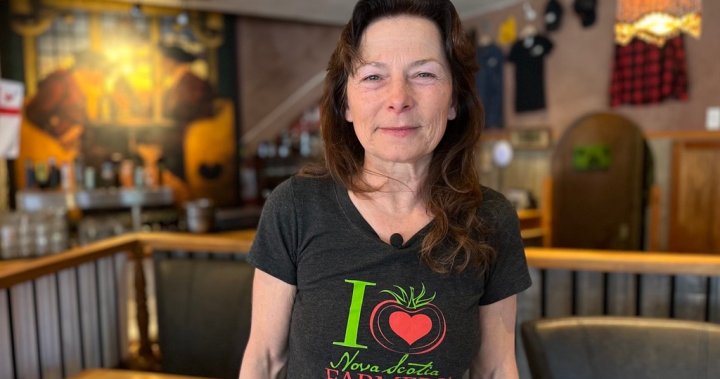When you think of Halifax, a few things may immediately come to mind about the city: a vibrant bar scene, a crowded waterfront and a popular landscape for artists.
However, rapid growth and development has translated to high housing costs and a dwindling number of arts venues, leading some to be concerned that the arts community is being brushed out of the market.
“I think Halifax needs to take another look at the designing of Halifax,” said Lil MacPherson, an entrepreneur, former mayoral candidate and environmental advocate.
MacPherson, who is co-owner of The Wooden Monkey restaurants in downtown Halifax and Dartmouth, says she’s concerned for Halifax’s cultural identity — especially when it comes to preserving heritage buildings.
“We really need to design a city that’s livable and likable and beautiful and have a lot of taste because we can’t just build buildings with no purpose,” she said.
Her restaurants are filled with art — from murals on the walls to prints from local artists for sale. She also makes an effort to offer a stage for local live performances.
She hopes all the change Halifax experiences will echo that kind of support for the arts.
“Either our young people will say, ‘What were you thinking?’ or ‘Thank you, you were thinking,’” she said.
Get daily National news
Get the day’s top news, political, economic, and current affairs headlines, delivered to your inbox once a day.
Halifax Mayor Andy Fillmore, who worked as a city planner, agrees it’s critical to protect Halifax’s built heritage and to give space for the arts to flourish.
“These are all important to me as mayor and important to our communities. As we grow, I’ll watch to see to make sure those things will be accommodated,” he said.
But for some artists, the growth and change has already made it difficult to stay in the urban areas.
Audrey Eastwood, the interim executive director of the Bus Stop Theatre Co-op, has seen it firsthand.
“I know artists who are spending like 60 to 70 per cent of their income on rent. They’re working multiple jobs to be able to do that,” said Eastwood.
“The burnout level, the unsustainability of that — how can we keep doing that?”
Audrey Eastwood, the interim executive director of the Bus Stop Theatre Co-op, says artists are finding it difficult to stay in the city.
Skye Bryden-Blom/Global News
The Bus Stop is a multi-use performance venue on Gottingen Street, in the city’s north end, and has been in operation since 2003. Eastwood says the co-op has to turn away about 150 days worth of rental a year because they don’t have the space to accommodate the demand.
“There were about 10 other similar-sized art spaces (available) to us in Halifax. All of them are gone,” she said.
“Either the landlord no longer wanted to rent or increased the rent too high for those spaces to continue to exist where they were, or they were in places that were sold and are now highrise developments.”
Although she says artists like herself want to stay in the city, it’s becoming too difficult. Eastwood herself has moved outside Halifax limits after facing skyrocketing rent prices.
“Funding is hard to get for the arts. There’s no venues left to do shows. What is the draw to stay in Halifax at that point if you can’t afford your rent?” she said.
This is Part 3 in our three-part series looking at development in Halifax and if we’re pricing too many people out. For a look at why some people disagree with all the highrise projects, read our first story here. The second installment, where we hear from a developer, can be found here.
© 2025 Global News, a division of Corus Entertainment Inc.
‘Take another look’: Some in Halifax can’t brush off rapid development plan


